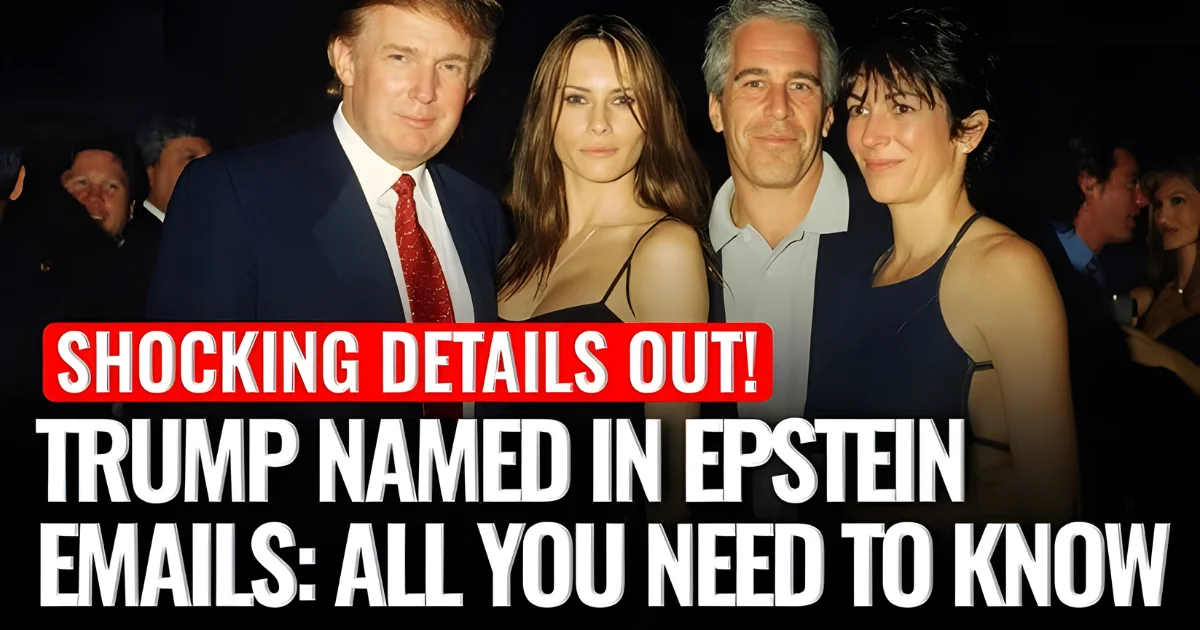Newly released Epstein emails reference Trump in social/business context from 2000s. What documents actually say vs. speculation. Legal analysis & facts!
Table of Contents
Court Documents Reveal Email Communications Between Epstein and Associates Mentioning Trump
Newly Released Legal Filings Show Correspondence Discussing Former President in Context of Social Connections
Newly unsealed court documents from ongoing litigation related to Jeffrey Epstein’s activities include email communications that reference Donald Trump, providing additional documentation of the social connections between the convicted sex offender and various high-profile individuals during the period before Epstein’s criminal activities became widely known. The emails, released as part of civil proceedings, offer limited new information but contribute to the growing documentary record of Epstein’s network.
The correspondence, dating from the early-to-mid 2000s, includes references to Trump in the context of social events, business discussions, and mutual acquaintances. Legal experts emphasize that mention in emails does not constitute evidence of wrongdoing and that the documents must be evaluated in full context alongside other evidence and testimony.
Legal analysts note the emails’ release is part of court-ordered transparency in civil litigation, with hundreds of pages of documents being unsealed on rolling basis as judges balance public interest against privacy considerations. The Trump-related emails represent a small portion of extensive correspondence being made public through these proceedings.
Understanding what these emails actually contain—and equally important, what they don’t reveal—requires careful examination of the court documents themselves rather than relying on headlines or social media speculation.
What the Emails Actually Say
Content Overview
Based on court filings and legal document summaries, the released emails include:
Social Event Coordination:
- References to Trump attending or being invited to social gatherings
- Discussion of mutual acquaintances in business and entertainment circles
- Event planning involving multiple high-profile individuals
- Standard social networking correspondence common in elite circles
Business Discussion:
- References to real estate matters (both Trump and Epstein had significant property holdings)
- Discussion of potential business connections
- Mention of mutual business associates
- General networking conversations
Important Context:
The emails date from a period when Epstein socialized openly with numerous celebrities, business figures, politicians, and others before his criminal activities became public knowledge in 2006-2008.
What the Emails Don’t Show
Equally important is understanding what these emails do not contain:
No Evidence Of:
- Criminal activity
- Knowledge of Epstein’s trafficking
- Participation in illegal conduct
- Ongoing close relationship beyond social acquaintance
Legal experts emphasize that association through social events or business discussions, particularly before criminal revelations, doesn’t constitute evidence of complicity or knowledge of criminal behavior.
Trump-Epstein Relationship Context
Known Timeline
1980s-1990s:
- Trump and Epstein both prominent in New York/Palm Beach social circles
- Attended some of the same events
- Both had properties in Palm Beach, Florida
- Social acquaintance relationship
2002:
Trump magazine interview quote: “I’ve known Jeff for fifteen years. Terrific guy. He’s a lot of fun to be with. It is even said that he likes beautiful women as much as I do, and many of them are on the younger side.”
2004-2005:
Reports of falling out between Trump and Epstein, allegedly over real estate deal
2008:
Epstein convicted in Florida; Trump publicly distanced himself
2019:
When asked about Epstein, Trump stated: “I had a falling out with him a long time ago. I don’t think I’ve spoken to him for 15 years.”
Important Distinctions
What’s Documented:
- Social acquaintance in 1980s-1990s
- Both attended some elite social events
- Business circles overlapped
- Relationship ended before Epstein’s conviction
What’s Not Established:
- Close personal friendship
- Business partnership
- Knowledge of criminal activities
- Contact after mid-2000s falling out
Legal Context:
Epstein cultivated relationships with numerous powerful individuals across business, politics, academia, and entertainment. Association alone doesn’t imply knowledge of or participation in criminal activities.
Why These Emails Are Being Released
Legal Process
Court-Ordered Unsealing:
- Part of civil litigation related to Epstein’s activities
- Judges balancing transparency vs. privacy
- Rolling release of documents over months
- Public interest in accountability
What’s Being Made Public:
- Emails and correspondence
- Flight logs and travel records
- Deposition transcripts
- Business and financial documents
Redactions:
- Protecting victim privacy
- Removing irrelevant personal information
- National security considerations in some cases
- Legal privilege where applicable
Scope of Document Releases
Hundreds of Individuals Mentioned:
The unsealed documents reference numerous high-profile figures including:
- Politicians from both parties
- Business executives
- Celebrities and entertainers
- Academics and scientists
- Foreign dignitaries
Context Matters:
Many individuals mentioned had legitimate professional or social connections to Epstein before his crimes became known and severed relationships afterward.
Legal and Factual Standards
What Constitutes Evidence
Legal Experts Emphasize:
Mere Mention ≠ Wrongdoing:
Being referenced in emails doesn’t establish:
- Criminal activity
- Knowledge of crimes
- Participation in trafficking
- Ongoing relationship
Context Required:
Full evaluation needs:
- Complete correspondence, not selective excerpts
- Timeline of relationships
- Testimony and depositions
- Corroborating evidence
- Credible allegations (not just association)
Professor Stephen Gillers, NYU Law:
“In a high-profile case like this, every name mentioned generates headlines, but legally, mere mention in correspondence means very little without context showing knowledge of or participation in criminal conduct.”
Investigative vs. Speculative
Responsible Analysis Requires:
- Verified court documents, not rumors
- Full context, not selective quotes
- Distinction between allegation and evidence
- Respect for legal process and standards
What to Avoid:
- Guilt by association
- Speculation without evidence
- Conflating social acquaintance with complicity
- Sensationalism over facts
Victim Advocacy Perspective
Centering Survivors
Important Principles:
Focus on Accountability:
Victim advocates emphasize document releases should:
- Support justice for trafficking survivors
- Hold accountable those who enabled abuse
- Prevent future exploitation
- Not become spectacle divorcing from actual crimes
Trauma-Informed Approach:
Media coverage should:
- Avoid graphic details re-traumatizing victims
- Center survivor experiences and justice
- Distinguish between perpetrators, enablers, and incidental associates
- Maintain focus on actual crimes, not celebrity intrigue
Lisa Bloom, Victims’ Rights Attorney:
“Every document release should be evaluated for whether it advances justice for victims or merely feeds public curiosity about famous names. The distinction matters.”
Political Implications
Partisan Dynamics
Political Use of Epstein Connections:
Both parties have attempted to weaponize Epstein associations:
- Republicans highlighting Democratic figures mentioned
- Democrats emphasizing Republican connections
- Both often selectively presenting information
Reality:
Epstein cultivated relationships across political spectrum, making partisan finger-pointing largely ineffective and distracting from actual accountability.
Trump Campaign Response
Official Statement:
Trump campaign characterizes emails as showing “routine social correspondence from decades ago, long before Epstein’s criminal activities became known, consistent with President Trump’s previous statements about ending their acquaintance 15+ years ago.”
Opponents’ Position:
Critics note the relationship existed and argue any association with Epstein warrants scrutiny, though acknowledge no allegations against Trump regarding Epstein’s crimes have been substantiated.
What Happens Next
Ongoing Document Releases
Expected in Coming Months:
- Additional emails and correspondence
- More depositions unsealed
- Financial records potentially released
- Continued court proceedings
Each Release Likely to Mention:
Numerous high-profile individuals as documents cover years of Epstein’s social and business activities.
Accountability Questions
Ongoing Investigations:
- Civil litigation continues
- Document analysis by investigators
- Potential new revelations
- Long-term accountability efforts
Frequently Asked Questions (FAQs)
What do the newly released Epstein emails say about Trump?
The unsealed emails reference Trump in contexts including social event coordination, business discussions, and mutual acquaintances, dating from the early-to-mid 2000s before Epstein’s criminal activities became widely known. The correspondence shows social and business circle overlap typical of elite New York/Palm Beach networks. Legal experts emphasize the emails don’t contain evidence of wrongdoing, knowledge of Epstein’s crimes, or close personal relationship beyond social acquaintance. The content is consistent with Trump’s previous statements about ending their acquaintance over 15 years ago.
Do these emails prove Trump was involved in Epstein’s crimes?
No. Legal experts uniformly emphasize that mention in emails or social acquaintance doesn’t constitute evidence of criminal involvement, knowledge of trafficking, or participation in illegal activities. No credible allegations have been made against Trump regarding Epstein’s crimes. The emails show social and business connections common in elite circles before Epstein’s criminal activities became public. Mere association, particularly before criminal revelations, is legally and factually distinct from complicity or wrongdoing.
Why are these emails being released now?
The emails are being released through court-ordered unsealing in ongoing civil litigation related to Epstein’s activities. Judges are balancing public interest in transparency and accountability against privacy considerations, releasing documents on rolling basis over months. The releases aren’t timed to political events but reflect litigation schedules and judicial decisions about which materials should be public. Hundreds of individuals are mentioned across thousands of pages of documents being unsealed.
How many other high-profile people are mentioned in the Epstein documents?
Hundreds of individuals across business, politics, entertainment, academia, and other fields are referenced in unsealed Epstein documents. These include politicians from both parties, business executives, celebrities, academics, and others who had social, professional, or philanthropic connections to Epstein before his crimes became known. Most severed relationships after criminal revelations. Legal experts emphasize that mention in documents doesn’t imply wrongdoing without specific allegations or evidence of knowledge of or participation in criminal activities.
Will more Epstein documents mentioning Trump be released?
Additional documents from Epstein-related litigation will likely be unsealed in coming months as court proceedings continue, potentially including more correspondence mentioning Trump along with many other individuals. The scope and content of future releases depend on judicial decisions about public interest, privacy considerations, and litigation needs. Any new documents should be evaluated in full context rather than through selective excerpts, with distinction between social acquaintance and evidence of wrongdoing.
Conclusion: Limited New Information in Broader Context
The newly released emails mentioning Trump in Epstein correspondence provide incremental additions to the documentary record of social and business connections between the two during the period before Epstein’s criminal activities became widely known. The content shows networking typical of elite circles but doesn’t reveal criminal conduct, knowledge of trafficking, or close personal relationship beyond social acquaintance.
What matters legally and factually is the distinction between association and complicity, between social acquaintance and knowledge of crimes, between being mentioned in correspondence and being implicated in wrongdoing. These emails, like other released documents, must be evaluated carefully with full context rather than through sensational headlines.
For victims of Epstein’s trafficking and abuse, document releases represent steps toward accountability and transparency, though advocates emphasize focus must remain on justice for survivors rather than celebrity intrigue. Every revelation should be measured by whether it advances accountability for actual perpetrators and enablers or merely feeds public fascination with famous names.
The broader question these document releases raise is how someone like Epstein operated for years with apparent social acceptance from elite circles across business, politics, and culture. Understanding that dynamic requires examining not just individual associations but systemic failures that allowed predatory behavior to continue.
As more documents emerge, responsible analysis requires distinguishing evidence from speculation, allegations from associations, and accountability from guilt by proximity. The Epstein case demands justice for victims and accountability for wrongdoing—standards that require evidence, not mere mention in old emails.

